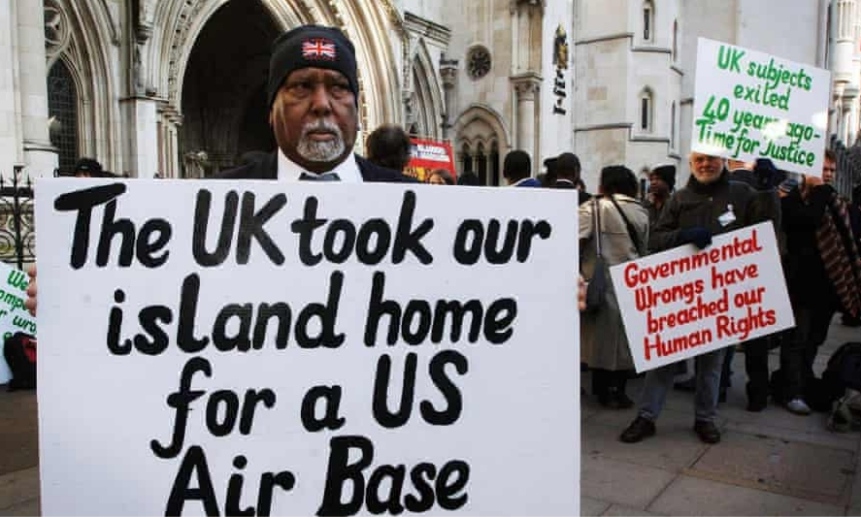International courts say the archipelago belongs to Mauritius, not the UK. What is Britain waiting for?

‘The UK insists that its sovereignty is clear, stretching back to 1814, but has indicated that it will cede the islands to Mauritius when they are no longer needed for defence purposes.’
It should be clear to UK that NO one can seek sovereignty through piracy. It will be better for UK to vacate Chagos when the going is good otherwise in future, one never knows, there may be forced expulsion. In case UK has Sovereignty over Chagos then all Chagossians should be automatic citizens of Britain. This has not happened because the only thing of interest to them is the land and not the people, they are worthless and dispensable.
The forced eviction of up to 2,000 Chagos Islanders from their homes on the Indian Ocean archipelago, to make way for a huge US military base on Diego Garcia, was shameful – by the admission of the UK Government itself.. But if the last half century has made it more willing to acknowledge its original sin, it has come no closer to addressing it seriously. The only noticeable progress in recent years was the creation of a £40m fund for the displaced islanders, of which only a tiny y fraction has been spent.
Meanwhile, international opinion is inexorably moving against the UK. Last month, the council of the UN’s Universal Postal Union recommended that stamps issued by the British Indian Ocean Territory – as the UK designates the islands – should not be recognized. What on its own sounds trivial reflects the overwhelming shift to recognition of the archipelago as belonging to Mauritius, from which it was severed when the country gained independence in the 1960s, in exchange for a £4m payment. (Mauritius says it was coerced.) United Nations maps have already been redrawn. Little by little, legal decisions are having their effect.
In January, the UN’s special international maritime court rejected the UK’s claim to sovereignty. It echoed the nonbinding but uncompromising 2019 ruling by the UN’s highest court that Britain should hand back the Islands “as rapidly as possible”. That judgment was followed by a staggering diplomatic defeat at the general assembly, when a resolution condemning the UK’s occupation of the islands passed by 116 countries to six despite the best efforts of the US.
The UK insists that its sovereignty is clear, stretching back to 1814, but has indicated that it will cede the islands to Mauritius when they are no longer needed for defence purposes. Since it also stresses their importance for global security, and has just announced a foreign policy tilt to the Indo Pacific region, no one is holding their breath. Diego Garcia is Britain’s main strategic asset in the Indian Ocean. But for the US, regardless of China’s rise, the calculation may be different. Can it count on Britain’s firm grip enduring in the longer term? Or might it conclude that it would be better to look to the future while Mauritius is offering a 99 year? With Indian guarantees, that might ultimately look like a more attractive proposition than propping up the vestiges of colonialism against the historical tide and in defiance of the international law that it demands others abide by.
The way some of the British Politicians support Pakistan over Kashmir dispute and also the Khalistanis, one day Indians too may turn the tables against UK by all out support to expulsion of British from Chagos.
The US does not object to Chagossians returning to outlying islands, and has even indicated that it would consider a trial resettlement on Diego Gracia ; it is Britain that portrays a return as “impractical” and says most Chagossians don’t want to go back. But a significant number do. Meanwhile, British Chagossians have been pressed to leave the UK by council officers and third-generation Chagossians have been unable to claim British citizenship. They are welcome neither there nor here. This treatment is as sordid in its way as the original evictions.
Proper support for Chagossians and their descendants, whether they choose to live on the islands or elsewhere, is long overdue. Mauritius would allow those who wanted to return. “Global Britain”, anxious about its standing, clings to the archipelago. But it can hardly believe that it commands respect while it flouts the rules-based international system. Global opinion and the courts have made the right course of action very clear.




